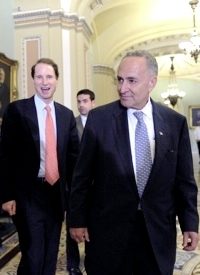
In July, the DISCLOSE Act (Democracy Is Strengthened by Casting Light On Spending in Elections Act) failed to pass a cloture vote in the Senate, 57-41, as a result of a successful Republican filibuster. However, the setback did not stop Senate Majority Leader Harry Reid from filing a “motion to recommit” to bring back the DISCLOSE Act, a bill that violates free speech by regulating campaign contributions. Today, the vote failed yet again, 59 to 39, without a single Republican breaking ranks.
Today’s vote caused quite a stir on the Internet, observed the Washington Independent, which reported, “It’s worth noting that the blogosphere has been alive with activity today — almost all of which is urging members to vote ‘no’ on the bill.”
Conservative pundit Michelle Malkin, along with Tea Party Nation, rallied conservatives nationwide by launching “Operation Buck Up Maine,” which asked Americans to contact Maine’s liberal Republican Senators Olympia Snowe and Susan Collins, two potential swing votes. Apparently the campaign worked, as both women voted “No.” Once they did, it was clear that the bill had no hope of passing, for without them, the Dems could not overcome the filibuster.
The DISCLOSE Act was the Democrat’s response to the Supreme Court’s ruling in Citizens United v. FEC. According to opencongress.org, “It seeks to increase transparency of corporate and special-interest money in national political campaigns. It would require organizations involved in political campaigning to disclose the identity of the large donors, and to reveal their identities in any political ads they fund. It would also bar foreign corporations, government contractors and TARP recipients from making political expenditures. Notably, the bill would exempt all long-standing, non-profit organizations with more than 500,000 members from having to disclose their donor lists.”
However, opposition to the bill observed a variety of problems with the legislation. Senate Minority Leader Mitch McConnell argued that the legislation would “protect unpopular Democrat politicians by silencing their critics and exempting their campaign supports from an all out attack on the First Amendment.”
Conservative website Hot Air saw the bill as targeting bloggers and “could be used to harass smaller, unfounded bloggers out of the realm of political debate.”
The Heritage Foundation asserted that “the ban on government contractors engaging in political speech will apply to over half of the fifty largest companies in the United States.”
Conservative pundit Michelle Malkin noted that the law “places radical speech-squelching restrictions on companies’ ability to run independent political ads.”
In addition to these assertions, the legislation ran into trouble when it began to exempt large organizations like the National Rifle Association and labor unions.
Malkin remarked, “What part of no more union pay-off gag orders masquerading as ‘reform’ doesn’t [Reid] understand?”
The bill was staunchly opposed by a variety of organizations, including the Congressional Black Caucus, Chamber of Commerce, the American Society of Association Executives, the National Right to Life Committee, and small organizations that did not fall under the provisions for exemptions.
According to Politico, “It is unclear whether Senate Democrats will try again on the bill during a lame-duck session post-elections, but even then approval would be an uphill battle.”
Photo: Senate Rules Committee Chairman Sen. Charles Schumer, D-N.Y., right, and Sen. Ron Wyden as they walk off of the Senate floor on July 27, 2010, prior to speaking to the press following a vote on the Disclosure Act: AP Images




